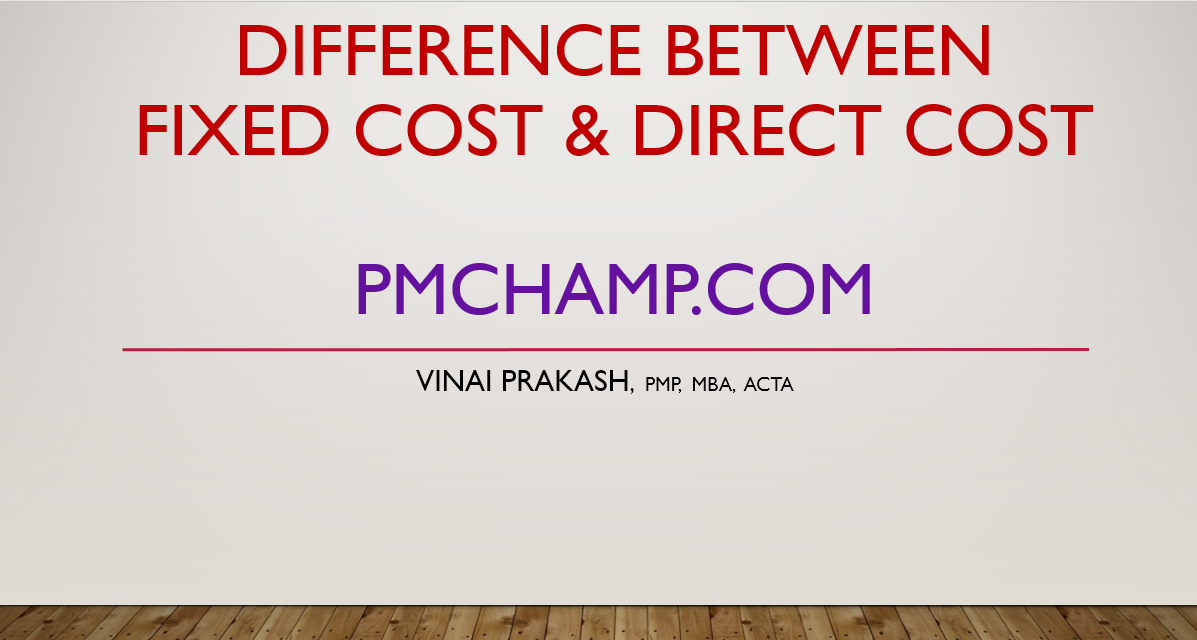Several PMP exam questions focus on the difference between Fixed Cost, Direct Cost, Indirect Cost & Variable Cost. These questions come from Cost Management knowledge area, but are also covered in Scope Management and Procurement Management.
Unfortunately the PMBOK Guide does not provide any detailed information on these cost types and their definitions. Thus, most PMP aspirants struggle with such questions. Here, I am giving you a clear difference between the costs, which I hope would help you in your PMP exam preparation.
Direct Cost are those cost that are incurred by your project. The project manager pays for these from the project budget. Costs incurred to train staff, send them to another location for a period, purchase equipment for use within the project are good examples of Direct cost.
Indirect costs are those costs that cannot be directly attributed to a specific project and therefore will be allocated over multiple projects by some approved accounting procedure. Coffee machine for the staff, computers purchased for the entire company, cost of deploying security personnel at the company, Telephone charges for employees, overall staff welfare, insurance costs etc. are usually paid by the company as a whole, and may be apportioned to other departments, projects, locations as per the agreed business practices and agreed accounting procedures.
Fixed Costs are usually for assets, buildings, rent, and things that do not change from month to month, throughout the life of the project. That’s why we call them Fixed cost. They have to be incurred, and there is no choice about it.
Variable Costs are for things that usually change from month to month, like the salary of staff, which really depends on the number of staff you employed in that month. It could also be for the cost of labor, which changes as the work changes. You may need electricians in a month, and plumbers in another month. A crane or earth-mover may be needed during some periods. These are all examples of variable costs.
Differentiating between Fixed cost and Direct cost may seem to be tough, when it comes to assets purchased. It is an asset, so it should be a fixed cost. The whole company may not need this asset, and it may be only required for the project, so it should be a direct cost. This creates confusion, and most PMP exam takers make a mistake in choosing the correct answer.
Actually, it is pretty simple. Just remember to check this one thing – who is paying for this asset purchase?
If it is the company paying from their overall budget for the future use by the entire company – like expanding into a new building, purchasing new PABX System for the whole company, or purchasing a common fax machine for everyone’s use (to be placed in the pantry area) – in this case it is a Fixed Cost.
If it is the project manager paying to purchase assets from the project’s budget, like purchasing a particular testing software to be used in the project for testing, sending a team to another country to study a new technology, buying relaxing chairs for the team who is working round the clock… then in this case, it is a case of Direct Cost.
If the project manager is buying the radio transmitters for the project’s use, it is a Direct cost, even though the transmitter is an asset, and may look like a good candidate for Fixed Cost.
Let’s try some sample PMP questions to gain further clarity.
1. Julie, the project manager, is going to send 3 programmers to Singapore to learn about Big Data Analytics technologies. She needs them to be experts with the new technology for her data mining project. As such, which type of project cost will she incur?
A. Direct Cost
B. Fixed Cost
C. Sunk Cost
D. Indirect Cost
Answer: A.
Since this training will directly benefit the project team, and will only be required because of the project, it is a good example of Direct cost.
2. During the testing phase, which will last almost a whole year, the test engineers will arrive from different parts of the world. Since the current company office does not have enough space for these test engineers, a nearby building will be rented to house these test engineers. What kind of cost is this?
A. Variable Cost
B. Opportunity Cost
C. Fixed Cost
D. Sunk Cost
Answer: C.
Rent is usually a fixed cost.
3. The project has incurred several cost overruns. Mark is the project manager, and he is seriously looking at ways to curtail further cost overruns. He must focus on which type of costs to make a significant impact on the project’s budget?
A. Direct costs and Indirect costs
B. Fixed Costs and Opportunity Costs
C. Fixed Costs and Variable Costs
D. Variable Costs and Direct Costs
Answer: D.
Both variable costs and direct costs impact the cost on the project immediately. Indirect costs are not so much in the control of the project manager. Opportunity cost, and sometimes sunk cost are used on PMP questions to confuse you. They are not impacting the cost of the project in any way, and should be ignored.
Hope this clarifies. Sunk cost and Opportunity costs are routinely bundled in with these 4 types of costs to confuse you. Kindly take note, and read carefully. I have written a detailed article on what is Sunk Cost and how to handle Sunk cost questions on the PMP Exam.
Cheers,
Vinai Prakash, PMP


Thanks for explaining this in detail Vinai. I was searching for the difference between direct and indirect cost, and this came in handy for my PMP exam preparation.
Thank you Vinai. That is a very crisp description.
Well explained, thank you very much to save my time